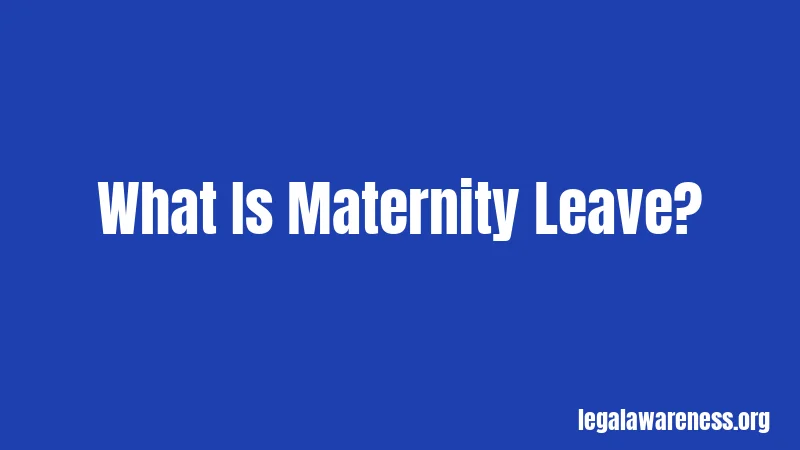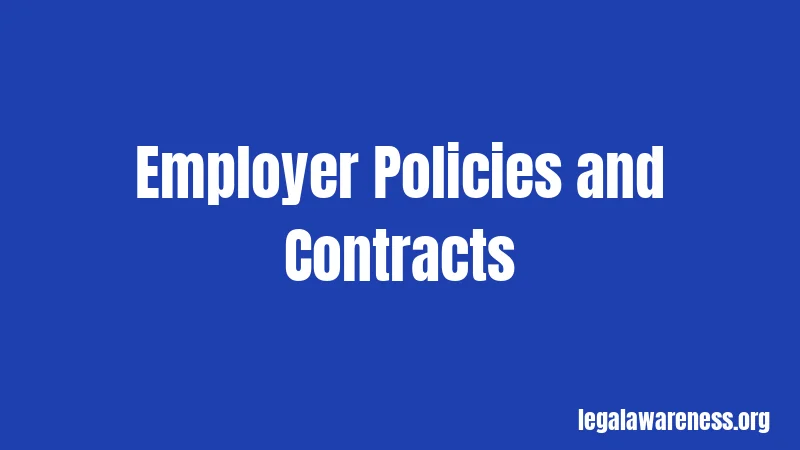Maternity Leave Laws in Florida (2026): What You Actually Need to Know
You’re probably wondering what kind of time off you get when you have a baby in Florida. The answer? It’s more complicated than you might think. Florida doesn’t have a state-specific maternity leave law, which surprises a lot of people. But that doesn’t mean you have zero protection.
Here’s what actually applies to you. Federal law and employer policies are what matters most. Let’s break down exactly what you need to know so you can plan accordingly.
What Is Maternity Leave?

Maternity leave is time off work that you take after having a baby. It’s supposed to let you recover and bond with your newborn. Think of it as protected time where your job stays safe while you’re out.
The tricky part? Every state handles this differently. Some states give workers tons of time off. Others leave it up to employers. Florida falls into that second group, honestly. But federal laws still apply, and that’s actually important.
Federal Protection: The Family and Medical Leave Act
Here’s the big one: the Family and Medical Leave Act (FMLA). This is federal law that applies nationwide, including Florida.
The FMLA gives you up to 12 weeks of unpaid leave per year. You can use this time off after having a baby. The catch? Your job is protected, but the leave is unpaid (though you might use accrued vacation or sick time if your employer allows it).
Who qualifies? You need to work for a covered employer. That means companies with 50 or more employees. You also need to have worked there for at least 12 months and put in at least 1,250 hours in that year. Sound complicated? It’s actually pretty straightforward.
Stay with me here. This matters a lot for planning.
What About State Protection?

Florida doesn’t have a specific state maternity leave law. This is the part that catches people off guard. You won’t find a Florida statute saying “all employers must give maternity leave.” That doesn’t exist.
What Florida does have is pregnancy discrimination protection under state law. Employers can’t treat you differently because you’re pregnant or had a baby. If another employee gets accommodations, pregnant employees must get them too.
This is important but different from maternity leave. It’s about fair treatment, not guaranteed time off.
Disability Leave and Pregnancy
Here’s where it gets interesting. Some Florida employers offer disability coverage. If you have short-term disability insurance through your job, you might be able to use it for maternity leave.
Pregnancy counts as a temporary disability under some policies. You get time off while you’re “disabled” from working. Not all employers offer this, though. You’ll need to check your employee handbook.
How much time? That depends entirely on your policy. Some give 6 weeks. Others give 12 weeks or more. Ask your HR department about this.
Employer Policies and Contracts

Here’s the reality: your employer’s policy matters more than state law in Florida. If your company has a maternity leave policy, that’s what applies.
Many large employers offer paid maternity leave. It’s common to see 6 to 12 weeks. Smaller companies? They might offer nothing, or just the FMLA minimum. Each employer decides.
Check your employee handbook. That’s literally your roadmap. If you can’t find it, ask HR directly. You deserve to know what you’re getting.
Not sure what counts as a good policy? Comparing notes with coworkers helps. You’re not alone if you’re confused about this.
Paid Leave Options You Might Have
This is where employer generosity comes in. Some Florida employers offer paid maternity leave. Some don’t. There’s no requirement for them to do it, but many do anyway because they want to compete for good employees.
If your employer offers paid leave, use it. Honestly, this is the best-case scenario. You get paid while you’re bonding with your baby. That’s rare and valuable.
Some employers also let you use accrued vacation or personal time for maternity leave. That counts as paid leave, basically. It’s your time, so you should be able to use it for this.
Short-term disability is another paid option. If you have it, it usually covers about 60-70% of your salary for 4 to 8 weeks.
Job Protection During Your Leave
Okay, pause. Read this carefully. This is the crucial part.
When you take FMLA leave, your job is protected. Your employer can’t fire you for taking maternity leave. You have to come back to work when your leave ends. They have to give you the same job or a similar one.
But here’s the thing: FMLA only covers employers with 50+ employees. If you work for a smaller company, FMLA doesn’t apply. Your employer could theoretically let you go. (That’s why it’s extra important to check your employment contract.)
Florida law also protects you from pregnancy discrimination. If your company treats pregnant employees worse than other employees, that’s illegal. But that’s different from guaranteeing maternity leave.
Medical Certification and Documentation
If you’re taking FMLA leave, your employer can ask for medical certification. They want proof that you need the time off. This is totally normal and legal.
Your doctor fills out a form. It confirms your pregnancy and expected delivery date. You’re not giving away private medical info beyond what’s necessary.
Some employers also ask for updates during your leave. Just make sure any documents you provide are only what the employer legally needs.
Keep copies of everything you submit. Seriously. Save emails, forms, and certifications. They protect you if questions come up later.
What Happens With Your Health Insurance
Your health insurance continues during FMLA leave. Your employer has to keep you on their plan while you’re out. You still pay your share of the premiums, though.
If you don’t have insurance through your employer, you might qualify for Medicaid coverage during pregnancy and after birth. Florida’s Medicaid program covers pregnant women and newborns under specific income limits.
Apply for Medicaid if you think you qualify. The application is free. You can apply through Florida’s Department of Children and Families website.
Your Sick Time and Vacation
Here’s a practical question people always ask. Can you use your vacation or sick time during maternity leave?
In Florida, you can if your employer allows it. There’s no state law requiring employers to let you, but many do. Your employee handbook should spell this out.
If your employer says yes, using vacation or sick time means you get paid during your leave. That’s obviously better than unpaid time off.
Want to double-check? Ask your HR department. Get it in writing if possible.
Returning to Work After Leave
When your maternity leave ends, you go back to work. Your employer has to let you come back. That’s the legal requirement.
You should get the same job, pay, and benefits you had before. If your company reorganized while you were out, you might not get your exact same position. But you get something equivalent.
If you’re struggling to transition back, talk to your HR department. Some companies offer part-time schedules or flexible arrangements for a while. Not required, but worth asking.
What About Bonding Time After Birth
The FMLA covers 12 weeks of leave for bonding. This starts after your baby is born. You can use it all at once or spread it out.
Some parents take a few weeks off in big chunks. Others take scattered days here and there. Your employer has to work with you, within reason.
If you’re planning to take bonding leave, tell your employer early. Give them as much notice as possible. They need time to prepare.
Pregnancy-Related Accommodations at Work
Even before your leave starts, you might need accommodations. Florida law requires employers to provide reasonable accommodations for pregnancy-related conditions.
What counts? Frequent bathroom breaks. Light duty work. A chair to sit in. Flexible scheduling for doctor’s appointments. These aren’t luxuries. They’re reasonable requests.
If your employer denies a reasonable request, that’s discrimination. Document everything. Save emails. Keep records of your requests.
Unpaid Leave and Your Rights
If you don’t qualify for FMLA (maybe you work for a small company), you might still get unpaid leave. Whether that’s guaranteed depends on your employment contract or your employer’s policies.
Some employers are generous and give unpaid leave even when not required. Others don’t. You won’t know unless you ask.
If your company offers unpaid leave, your job might be protected anyway. Check your employment agreement. Some contracts promise job protection even for unpaid time off.
State Resources and Help
Florida has resources to help you understand your rights. The Florida Commission on Human Relations investigates pregnancy discrimination complaints. If you believe you’ve been discriminated against, you can file a complaint.
The process is free. You don’t need a lawyer. The agency investigates on your behalf.
It usually takes a few months. You need to file within 365 days of the discrimination. Keep records of everything.
Planning Your Maternity Leave
Here’s what you should do right now. First, check your employee handbook. Look for maternity leave policies. Second, talk to HR. Ask about FMLA eligibility, paid leave options, and any company-specific policies.
Third, get it in writing. Ask HR to confirm your leave status in an email. Save that email.
Fourth, plan your finances. If your leave is unpaid, you’ll need savings to cover lost income. Some people save for months before having a baby.
Fifth, document everything. Keep emails about your leave request. Save your medical certification. Keep HR responses. This protects you.
Frequently Asked Questions
Do I get paid maternity leave in Florida? Not automatically. FMLA provides unpaid leave. Paid leave depends on your employer. Some Florida employers offer it. Many don’t. Check your employee handbook or ask HR.
How long can I take off for maternity leave? FMLA covers 12 weeks unpaid. Your employer might offer more paid time. That depends entirely on their policy. Ask your company what they offer.
Can my employer fire me for taking maternity leave? No, if you qualify for FMLA. They can’t legally fire you. However, if you work for a small company (fewer than 50 employees), FMLA doesn’t apply. Check your contract to see if you’re protected anyway.
Do I have to tell my employer I’m pregnant? You should tell them at some point, especially when you need accommodations or are taking leave. You don’t have to announce it immediately, but timing matters for planning leave.
What if my employer denies my maternity leave request? First, ask why in writing. Second, check if you qualify for FMLA. Third, contact the Florida Commission on Human Relations if you think it’s discrimination. Get legal advice if needed.
Can I use vacation time for maternity leave? Usually, yes. But your employer has to allow it. Check your handbook. Some employers force you to use vacation as part of your maternity leave. Others let it be separate.
Is maternity leave the same as disability leave? Not exactly. Disability covers recovery from childbirth. Maternity leave covers both recovery and bonding time. Some policies combine them. Check your company’s specific policy.
What happens to my health insurance during leave? Your employer must continue your health insurance during FMLA leave. You keep paying your share of premiums. After your leave ends, coverage continues.
Final Thoughts
Florida doesn’t guarantee maternity leave like some states do. That’s the bottom line. But you’re not without protection. Federal FMLA law applies to large employers. Pregnancy discrimination is illegal. Your company’s policies might be generous.
Now you know the basics. The next step is checking your specific situation. Look at your employee handbook. Talk to HR. Get answers in writing. Plan your finances.
Maternity leave is confusing, but you’re not alone in feeling uncertain about it. Take your time figuring it out. Ask questions. Protect yourself with documentation.
Stay informed, stay organized, and reach out for help if you need it. You’ve got this.
References
- U.S. Department of Labor: Family and Medical Leave Act (FMLA)
- Florida Statutes Chapter 760: Civil Rights
- Florida Commission on Human Relations: Pregnancy Discrimination
- Florida Department of Children and Families: Medicaid Coverage
- Society for Human Resource Management: Maternity Leave Guidelines
- National Women’s Law Center: State Maternity Leave Laws
